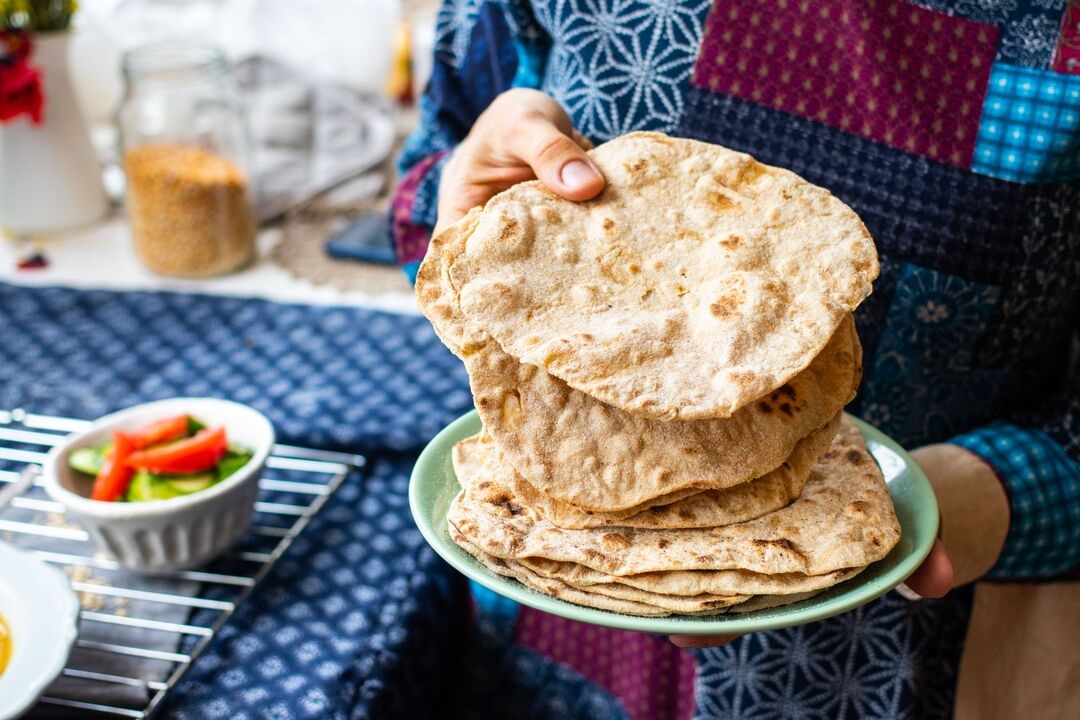Flour treatment specialist Mühlenchemie offers a series of enzyme systems that improve flours for baking flatbreads. The new toolkit contains improvers that offer solutions for all the different kinds of flatbread.
Flatbread is a staple in many countries, including the Near and Middle East and in Africa. In many of these regions, the industrialisation of food production has advanced greatly in recent years, and flatbreads are no longer made exclusively artisanally, but also industrially. In the western nations as well, immigration and the trend to ethnic foods have made flatbread more and more popular.
Flatbreads have widely varying characteristics, and can be divided into single layered, leavened or unleavened, and double layered varieties. In the Near East and Maghreb, for example, double layered flatbreads like baladi and khobz are popular. Familiar varieties like naan, parotha and chapati are single layered flatbreads. The growth of this already large market and the rising demands on production prompted Mühlenchemie to develop a new product line. The company has thus expanded its portfolio of enzyme solutions to offer a comprehensive range of improvers for flatbread, in addition to its existing products for bread, rolls, pasta and pastry.

Industrial manufacture places new demands
In industrial production the central goal is to make flatbreads with consistent quality. In order to do this, producers need flour that is standardised to certain specifications. These differ depending on the product and region. The many flatbreads made in the traditional way also need flour with the right qualities. A major challenge is that the flour has to be easy to roll out, while also being thin, stable and tear-resistant enough for mechanical working.
Flatbread is best eaten fresh. One sign of freshness is that the bread is easy to fold. Depending on the type of flatbread, it may have to stay fresh for several days without getting too dry or too soft in its structure. Thus, despite its large surface area the baked flatbread must not lose too much moisture through evaporation, as water loss and recrystallisation of the starch would otherwise make the bread drier and less flexible.
Improving quality and economy
This multiplicity of requirements led Mühlenchemie’s enzyme specialists to develop a toolkit that makes the production of all types of flatbread easier. It consists of a series of enzyme systems for breads with short baking times that provide better dough working and baking characteristics. These include higher stretch, rollability and dough stability, and better browning during baking, which also intensifies the flavour. The solutions in the toolkit extend fresh-keeping as well. Improving the economy of flatbread production was an important criterion in the development of the toolkit. Thus, it includes solutions that make it possible to use flour with low falling numbers, and other cheaper wheats, without sacrificing the quality of the final product. The enzyme systems in the toolkit also help the dough absorb more water. This gives higher dough yield for the same amount of raw materials.
New improvers for specific products
The flatbread toolkit consists of several Alphamalt improvers, the EMCEbest WA Visco+ and EMCEbest Flatbread RoG improvers, and specific enzymes. Used individually and in combinations, they provide targeted solutions for many different requirements in the manufacture of flatbread.
Alphamalt Flatbread can be used for a wide variety of flatbread applications. This improver makes dough more stretchable and improves mechanical as well as manual kneading. It also reduces dough contraction, improves browning and gives the finished flatbread a better chew sensation.
Alphamalt Flatbread Plus is likewise applicable for many flatbreads. It provides the same benefits as Alphamalt Flatbread, with the additional function of extended fresh-keeping. Flatbreads stay soft in storage, so that they still fold and roll well.
Alphamalt Parotha was developed especially for parotha, a flatbread that is kneaded by hand and pan-baked. This improver makes the dough less sticky so it rolls out better, and also provides extended freshness preservation for the finished product.
Alphamalt Flatbread Crumb is ideal for thicker flatbreads like Turkish pide and various types of tandoori breads. This improver stabilises the dough during fermentation and baking. It also gives a fluffy dough, more volume and better browning. The finished bread is softer and easier to break, without being too dry.
Alphamalt Tandoori is ideal for naan and tandoori breads. It reduces the stickiness of the dough, and gives it more stability. It also increases water absorption and makes the dough more flexible without making it sticky. Furthermore, it extends workability time.
EMCbest Flatbread RoG is used primarily for tandoori breads and Egyptian flatbread. This improver raises the dough’s falling number and so increases its stability. The dough remains workable for several hours, without sticking.
EMCbest WA Visco+ can be used for making all kinds of flatbreads. It increases the dough’s water absorption capacity without making it stickier.
Alphamalt Fresh FB is a family of improvers that can be used for double layered flatbreads like pita and Egyptian baladi, to give longer freshness and softer bread that can be easily folded or rolled. This group contains the improvers Alphamalt Fresh FB 71015 and Alphamalt Fresh FB 71016.

 iConnectHub
iConnectHub
 Login/Register
Login/Register Supplier Login
Supplier Login



























